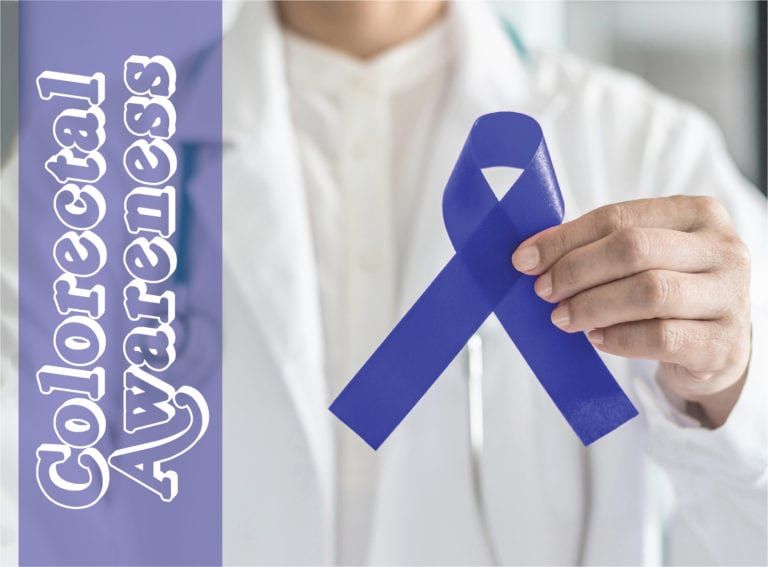Colorectal Awareness

March 2020: March is Colorectal Awareness Month. Colorectal cancer (often called colon cancer) occurs in the colon or rectum. The colon is the large intestine or large bowel. The rectum is the passageway that connects the colon to the anus. Sometimes abnormal growths called polyps form in the colon or rectum, which may turn into cancer.
How Common Is Colorectal Cancer?
Among cancers that affect both men and women, colorectal cancer is the second leading cause of cancer deaths in the United States. Every year, over 140,000 Americans are diagnosed. The American Cancer Society expects 53,200 deaths during 2020.
Am I At Risk?
Risk increases as we age. More than 90% of colorectal cancers occur after the age of 50. Other risk factors include having inflammatory bowel disease such as Crohn’s disease or ulcerative colitis, a personal family history of colorectal cancer or polyps, or genetic syndromes such as familial adenomatous polyposis or hereditary non-polyposis colorectal cancer (Lynch Syndrome).
Lifestyle contributes to an increased risk as well.
• Lack of physical activity
• A diet low in fruits and vegetables
• A low-fiber / high-fat / high processed meats diet
• Becoming overweight/obese
• Consuming alcohol
• Using tobacco
How Can I Reduce My Risk?
Overall, the most effective way to reduce your risk of colorectal cancer is to get screened for colorectal cancer routinely, beginning at age 50.
If you’re an adult outside the age range of 50-70, ask your provider if you are at high risk of getting colorectal cancer and take preventative measures, such as:
• Be physically active
• Keep a healthy weight
• Don’t drink excessive alcohol
• Don’t smoke
If you’re doing what you can to stay healthy, it is still important to be screened. Almost all colorectal cancers begin as precancerous polyps (abnormal growths) in the colon or rectum and can be present for years causing no symptoms before invasive cancer develops. Regular screenings can find these precancerous polyps so they can be removed before they turn into cancer. Screening also finds cancer early when treatment is most effective.
What Are the Symptoms?
Colorectal polyps and cancer often don’t cause symptoms, especially in the beginning stages. That is why screening is so important. If symptoms do begin, they may include:
• blood in or on the stool (bowel movement)
• stomach pain, aches or cramps that do not go away
• losing weight without explanation
What is a Colonoscopy Screening?
For a colonoscopy, a doctor uses a long, thin, flexible, lighted tube to check for polyps or cancer inside the rectum and the entire colon. During the test, the doctor can find and remove most polyps and some cancers, or biopsy as needed. A prep kit is required to clean out the colon. Patients are typically sedated (asleep) during the procedure.
When Should I Have a Colonoscopy?
Colonoscopies should be done beginning at 50, every 10 years for people who do not have an increased risk of colorectal cancer.
Is Screening Covered?
Most insurance plans and Medicare pay for colorectal cancer screening for people who are 50 years old or older. Check with your insurance plan to find out what benefits are covered for colorectal cancer screening.
SCHEDULE YOUR COLONOSCOPY
Kerry Baum, MD – 435.722.6143 or 435.781.2030
Kent Smith, MD – 435.722.6143
John Wells, MD – 435.725.7468
Jeff Wheeler, DO – 435.725.7469
Gary White, MD – 435.725.2020
ubh.org/find-a-provider

